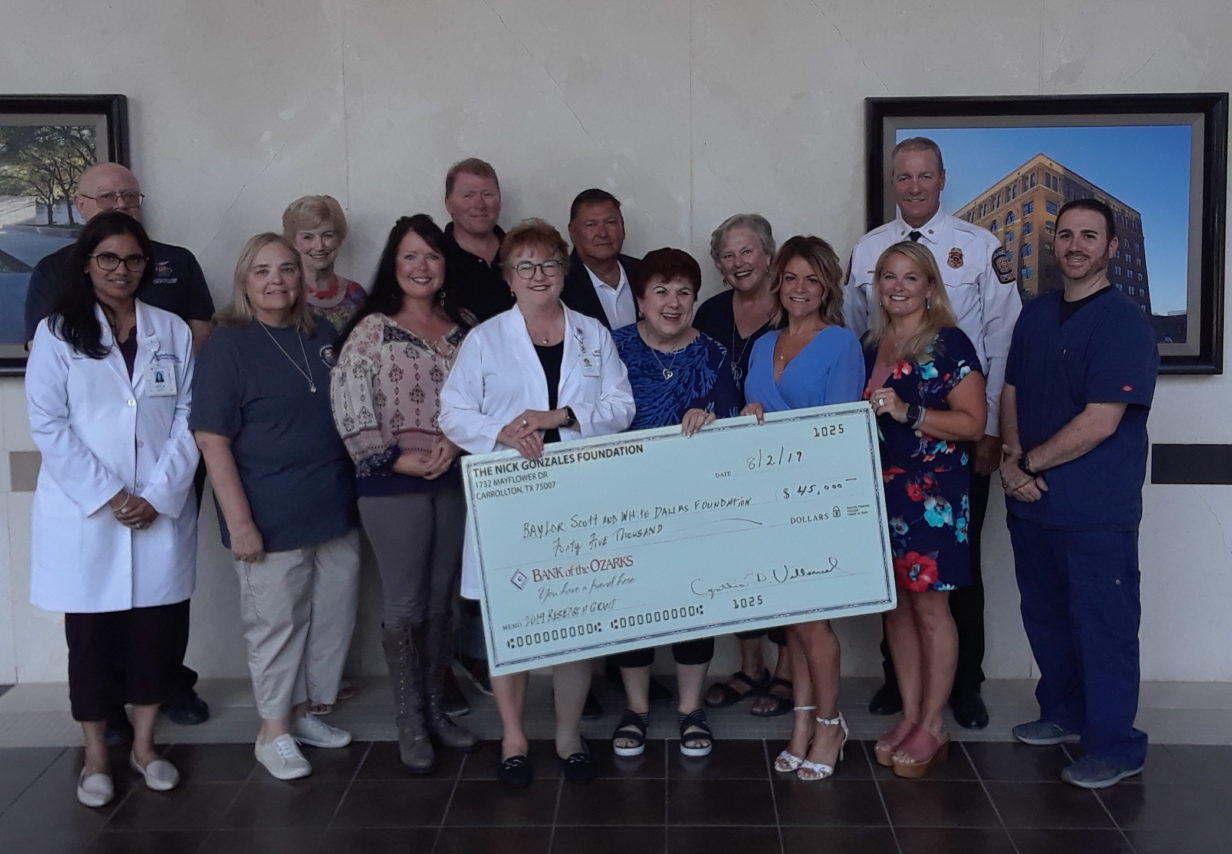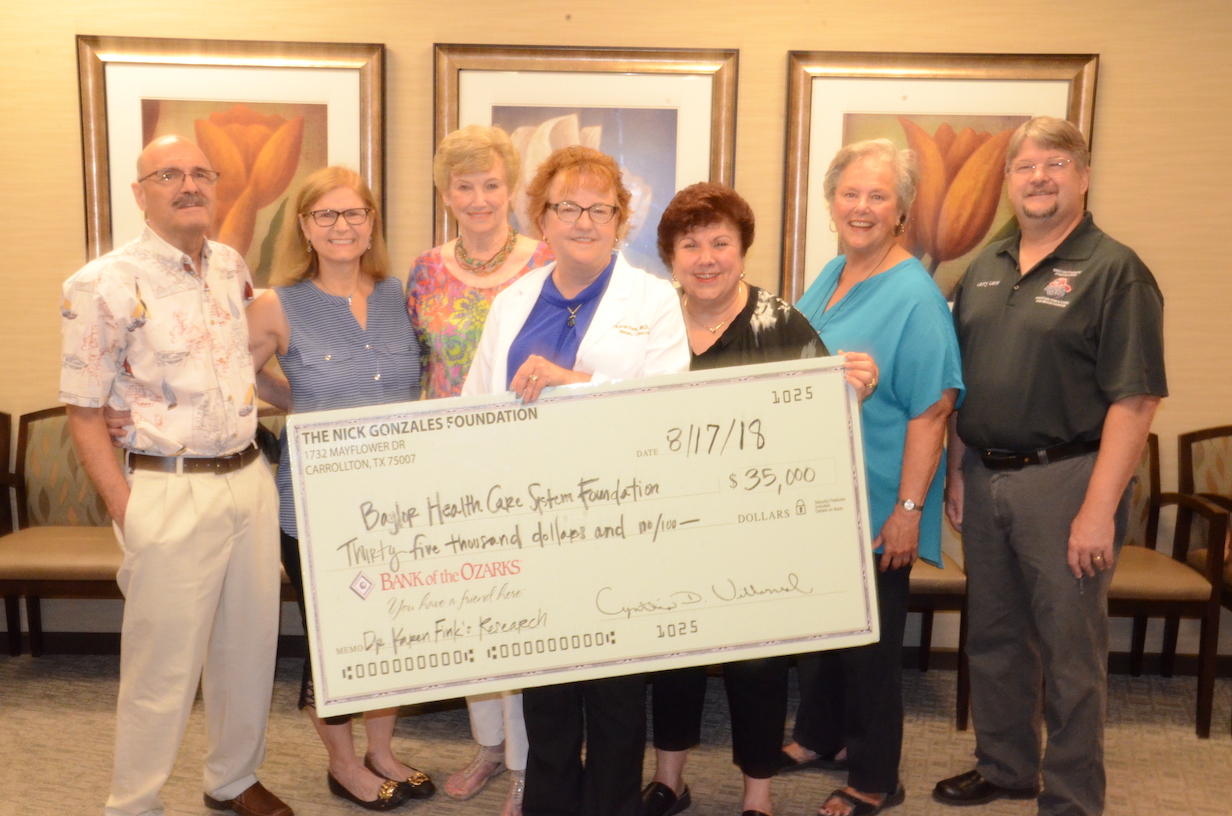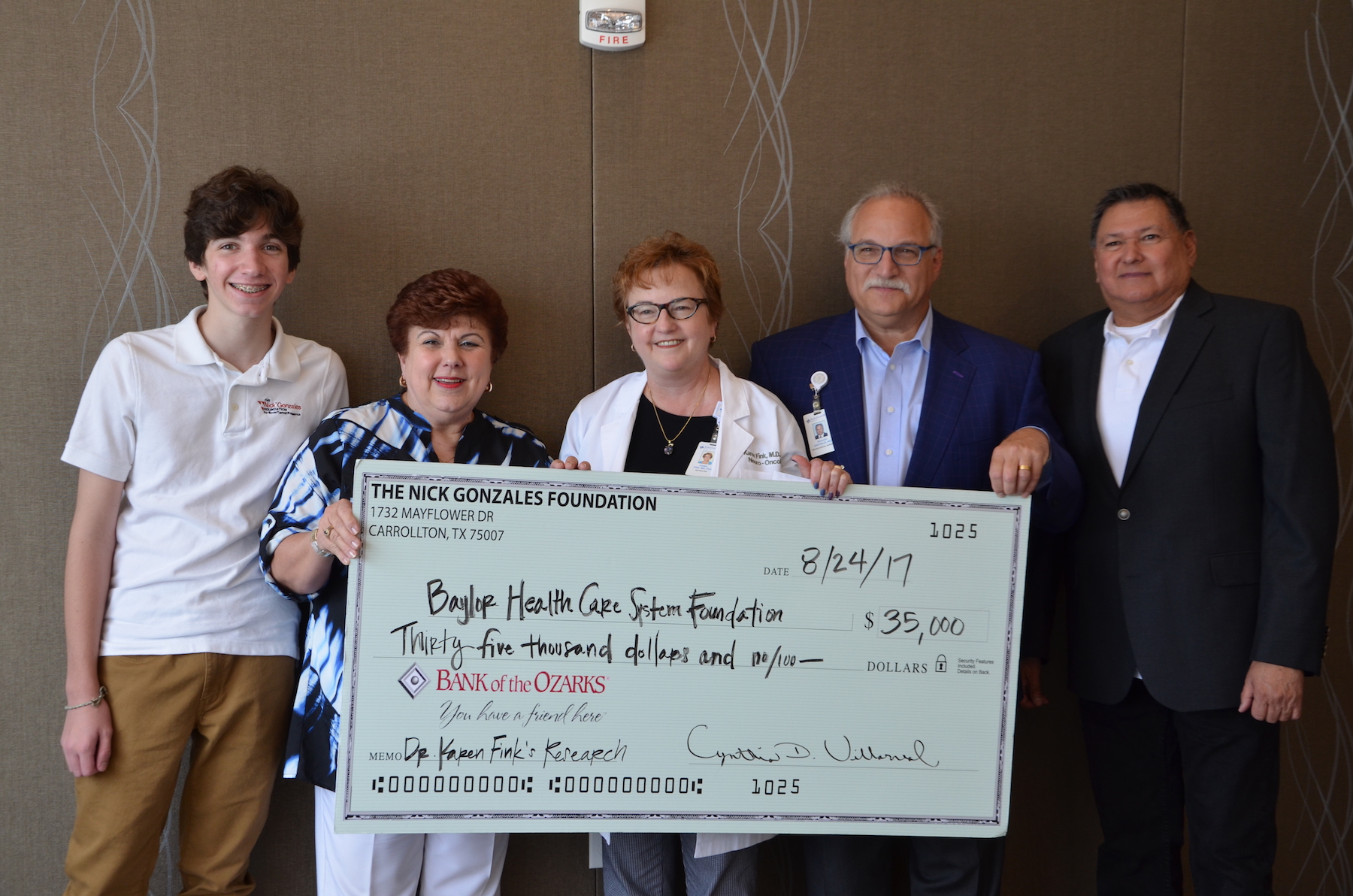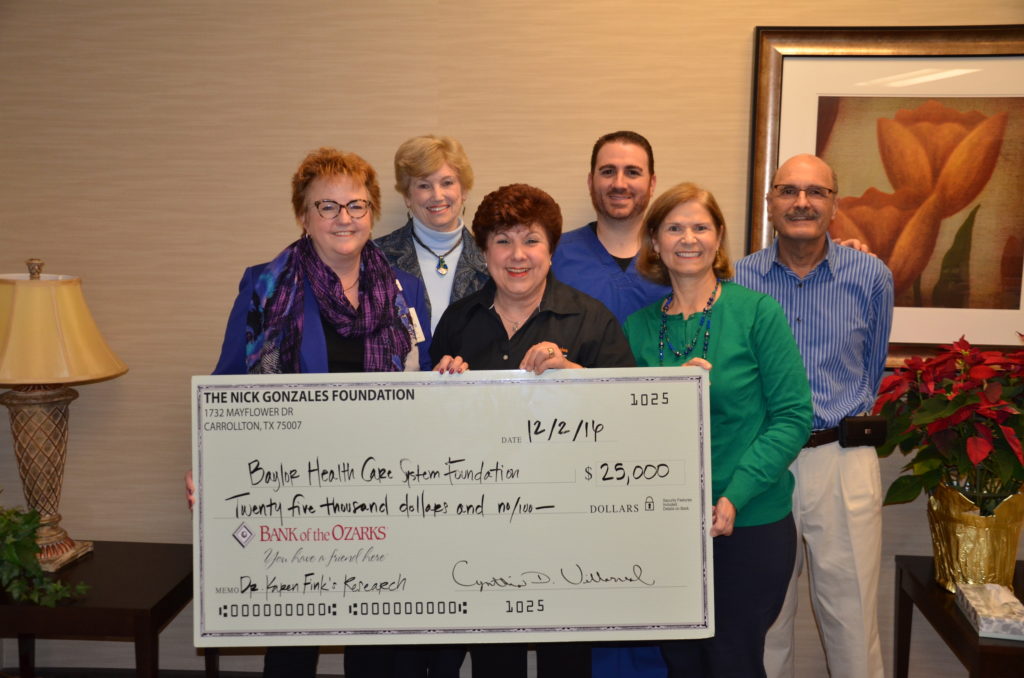The Awards Given out by The Nick Gonzales Foundation
Over the years, The Nick Gonzales Foundation has donated over $525,000 to many different organizations to help the fight against brain cancer. None of this is possible without the Donations received. Consider donating today.
2022
Funding annual research grants for glioblastoma multiform brain tumors (GBM) is one of the key goals of the Nick Gonzales Foundation. The Foundation had another blessed year in 2019 with total research grants awarded in Nick’s memory increasing to a total of over $525,000 since inception. In 2022, grants were awarded included:
-
-
-
- 2022 BCRA – $40,000 to Dr. Karen Fink and Baylor Dallas
“With COVID in the rear view mirror, clinical trials for brain tumor patients are finally re-opening. At Baylor Scott & White, we will be using berubicin, a chemotherapy based on an effective breast cancer drug group (anthroacyclines) that is designed to get into the brain and stay there, overcoming the blood brain barrier to more effectively treat recurrent glioblastoma. We also inaugurated our Laser Interstitial Thermal Therapy (LITT) device for our brain tumor patients with recurrent, surgically accessible tumors. This allows us to do a small biopsy to be sure we are dealing with the tumor, and then treat the tumor with laser heat from the inside. We will also be studying the Optune device for patients much earlier in the course of the disease. Currently, the device is used after radiation therapy and this trial will move that treatment up to during radiation therapy to see if earlier treatment improves survival. I am also using the FDA approved IDH inhibitor ivosidenib for my patients with progressing IDH mutated gliomas, and following outcomes.”
Dr. Karen Fink
-
- $40,000 to Children’s Medical Center – Dallas for Dr. Sam McBrayer
Dr. Sam McBrayer is studying how changes in metabolism influence brain tumor development and create new opportunities for glioma therapy. He is particularly interested in understanding how small molecule metabolites impact the structure of DNA and regulate gene activation in brain cells that are becoming cancerous. Through the generous support of the Nick Gonzales Foundation for Brain Tumor Research, we have designed and developed new tools to study the interaction between metabolites and DNA. These tools involve CRISPR technology, which can be used to edit the genes in brain tumor cells in a highly specific manner. Using this technology, we will be able to pinpoint genes involved in metabolism that are responsible for aberrant DNA structure found in glioma cells. This research may offer new insights into the molecular processes that occur at the very beginning of brain tumor development. It may also point to new targets for therapy that could be engaged to combat brain tumors in the clinic.
-
-
2021
Funding annual research grants for glioblastoma multiform brain tumors (GBM) is one of the key goals of the Nick Gonzales Foundation. The Foundation had another blessed year in 2019 with total research grants awarded in Nick’s memory increasing to a total of over $445,000 since inception. In 2019, grants were awarded included:
-
-
- 2021 BCRA – $20,000 to Dr. Karen Fink and $5000 to Children’s Medical Center, Dallas
- $5000 to Children’s Research Institute (Children’s Medical Center – Dallas) for Dr. McBrayer & Dr. Abdullah Research
Glioblastoma is a malignant brain tumor that is one of the most aggressive human cancers. One of the main challenges in treating these tumors is that each patient has a unique tumor “signature”. Despite this, nearly all glioblastoma patients receive the same treatment of chemotherapy and radiation. Our research efforts focus on developing personalized drug treatments that are based on a patient’s individual tumor characteristics. This type of personalized, precision care is only possible with advanced research and investigation of patient tumor samples to help develop and test promising new drugs. This generous donation from the Nick Gonzales Foundation for Brain Tumor Research will help us develop the tools needed to provide personalized brain tumor care for patients in the DFW region and beyond. - $20,000 to Dr. Karen Fink, BaylorScott & White Healthcare Foundation – Dallas – The generous support from the Nick Gonzales Foundation has helped to support our BaylorScott & White Neuro-Oncology clinical and basic science brain tumor research program. Our clinical trials help expand our therapeutic arsenal, and our basic science research aims to learn fundamental things about how brain tumor cells interact with their environment and with the immune system. As exciting as immune therapy of cancer has become in the recent 5 years, the existing immunotherapy approaches have not been impressive in the treatment of glioblastoma. One of our clinical trials in collaboration with the National Institute of Cancer uses a potent immune system stimulator, pembrolizumab, in combination with a heat shock protein vaccine derived from each patient’s glioblastoma cells. We are excited to offer a clinical trial for patients with low grade gliomas, an underserved population in brain tumor research. We will participate in a study of the IDH inhibitor AG881 for patients with brain tumors that have a mutation in the IDH1 gene. If the trial is successful, the treatment may allow patients with IDH1 mutated tumors to avoid or delay radiation therapy. There are several other trials in our Neuro-Oncology pipeline, and I am looking forward expanding our treatment options.
Our basic science efforts in collaboration with TGen will study how brain tumor cells and immune cells interact, with the goal of understanding these interactions to improve immune therapies of patients with glioblastoma. A state-of-the-art technology, called spatial transcriptomics, will be applied to tumor tissue specimens from glioblastoma patients. The project will measure expression of several hundred genes which will reveal the immune cell type, functional state, and proximity to neighboring (tumor) cells. This spatial information will help us refine strategies to best target and negate the immuno-suppressive activity of brain tumor cells so that the patient’s own immune cells can recognize and attack the tumor. Brain tumor research is really accelerating as we emerge from the COVID epidemic, and I am also looking forward to activating several multi-site clinical trials of new agents for both newly diagnosed and recurrent glioblastoma. We are also compiling blood and urine specimens from glioblastoma patients throughout the course of their illness to look for the presence of genes or proteins in microvesicles that might help us detect recurrences, potentially even earlier than an MRI scan. We are exploring a bio-marker optimized treatment strategy for glioblastoma patients, including a biomarker panel that identifies sensitivity to an orally available arsenic-derived compound. This will require multi-institution collaboration and we are still in the design stage.
-
2020
Due to the COVID 19 pandemic and cancellation of our annual fundraising event, no research grant was awarded for 2020.
2019
Funding annual research grants for glioblastoma multiform brain tumors (GBM) is one of the key goals of the Nick Gonzales Foundation. The Foundation had another blessed year in 2019 with total research grants awarded in Nick’s memory increasing to a total of over $445,000 since inception. In 2019, grants were awarded included:
-
- $45,000 – Dr. Karen Fink – BaylorScott & White

$45,000 awarded to Dr. Karen Fink, neuro-oncologist, BaylorScott & White University Medical Center, Dallas. Dr. Fink’s most exciting project supported by current contributions from the Foundation is a collaboration with her molecular scientific partner, TGEN. She is working to determine which patients are most likely to have tumors that could respond to the combination of temozolomide and arsenic trioxide. She is collecting brain tumor samples and creating mouse tumors from patients’ cells looking for the genetic signature that predicts response. She is also involved with two big studies that are being published in JAMA (December 2018) about the Novocure device and long term survival AND another trial in progress for patients with recurrent tumors. Dr. Fink expects this study to be published in Lancet in the near future which is very exciting to all at Baylor. Dr. Fink has also re-opened the TOCAGEN trial for GBM patients with recurrent tumors that can be re-sected. This trial uses a mouse leukemia virus to insert a gene into the residual tumor cells, making them susceptible to a non-chemotherapy pill the patient takes later. The potential benefit of this is very exciting.
- $45,000 – Dr. Karen Fink – BaylorScott & White
2018
Funding annual research grants for glioblastoma multiform brain tumors (GBM) is one of the key goals of the Nick Gonzales Foundation. The Foundation had another blessed year in 2016 with total research grants awarded in Nick’s memory increasing to a total of over $400,000 since inception. In 2018, grants were awarded included:
-
- $35,000 – Dr. Karen Fink – BaylorScott & White

$35,000 awarded to Dr. Karen Fink, neuro-oncologist, BaylorScott & White University Medical Center, Dallas. Dr. Fink’s most exciting project supported by current contributions from the Foundation is a collaboration with her molecular scientific partner, TGEN. She is working to determine which patients are most likely to have tumors that could respond to the combination of temozolomide and arsenic trioxide. She is collecting brain tumor samples and creating mouse tumors from patients’ cells looking for the genetic signature that predicts response. She is also involved with two big studies that are being published in JAMA (December 2018) about the Novocure device and long term survival AND another trial in progress for patients with recurrent tumors. Dr. Fink expects this study to be published in Lancet in the near future which is very exciting to all at Baylor. Dr. Fink has also re-opened the TOCAGEN trial for GBM patients with recurrent tumors that can be re-sected. This trial uses a mouse leukemia virus to insert a gene into the residual tumor cells, making them susceptible to a non-chemotherapy pill the patient takes later. The potential benefit of this is very exciting.
- $35,000 – Dr. Karen Fink – BaylorScott & White
2017
Funding annual research grants for glioblastoma multiform brain tumors (GBM) is one of the key goals of the Nick Gonzales Foundation. The Foundation had another blessed year in 2016 with total research grants awarded in Nick’s memory increasing to a total of over $365,000 since inception. In 2017, grants were awarded included:
-
- $35,000 – Dr. Karen Fink – BaylorScott & White

Dr. Karen Fink’s mission at Neuro-Oncology Associates is to treat each patient as an individual and provide comprehensive, compassionate, and innovative tumor care that will lead to the best possible outcome. She strives to incorporate the latest in clinical trials and treatment options where appropriate so that her patients will sustain hope for positive outcomes and an improved quality of care. As a member of the Brain Tumor Trials Collaborative, Dr. Fink and her research team focus on investigating the effectiveness and safety of treatment regiments to fight the most common and aggressive type of brain tumor – glioblastoma multiforme – GBM.
- $35,000 – Dr. Karen Fink – BaylorScott & White
- $3000 – The Musella Foundation – Dr. Al Musella, President
Dr. Musella maintains a list of clinical trials throughout the country on brain tumors at www.virtualtrials.com. He also works closely with the brain tumor community to help push for specific drug approvals for brain tumors through the FDA and provides a fund to aid patients with medical expenses and so much more. Our $3000 Grant will help provide funding for their patient assistance programs.
2016
Funding annual research grants for glioblastoma multiforme brain tumors (GBM) is one of the key goals of the Nick Gonzales Foundation. The Foundation had another blessed year in 2016 with total research grants awarded in Nick’s memory increasing to a total of $327,000 since inception. In 2016, grants were awarded included:
- $25,000 – Dr Karen Fink, Baylor Healthcare Foundation – Dallas

New research in brain tumor treatment is focused on studying individual tumors at the molecular and genetic level. This allows her to pick a treatment regimen that has the best probability of success for each patient, rather than a “one size fits all” approach. Dr. Fink is participating in several clinical trials in cooperation with the Brain Tumor Trials Collaborative that offer innovative therapies for newly diagnosed or recurrent malignant brain tumors. One trial involves the creation of a vaccine for the treatment of newly diagnosed brain tumors. For that trial, a sample of the patient’s tumor is taken during surgery and used to create a vaccine to trigger the body to fight the tumor. Another treatment being studied involves a device that the patient can wear, which delivers electric fields directly to the scalp to interrupt and slow tumor growth.
2015
- $18,000 – Dr. Karen Fink, BaylorScottWhite Healthcare Foundation – Funds new research concepts and active protocols for brain tumors. As a member of the Brain Tumor Trials Collaborative, Dr. Fink’s goal is to stop the growth of GBMs and improve the quality of life for those coping with a brain tumor diagnosis.
- $8,000 – Dr. Robert Bachoo and Dr. Elizabeth Maher, UT Southwestern – Funds cutting-edge studies on glioblastoma metabolism that is generating insights into new treatment targets.
2014
Funding annual research grants for glioblastoma multiforme brain tumors (GBM) is one of the key goals of the Nick Gonzales Foundation. The Foundation had another blessed year in 2014 with total research grants awarded in Nick’s memory increasing to a total of $276,200 since inception. In 2014, grants were awarded to: including:
- $25,000 – Dr Karen Fink, Baylor Healthcare Foundation – Dallas Dr. Fink is one of the principal investigators in the Brain Tumor Trials Collaborative (BTTC) that is hosted at UT MD Anderson Cancer Center in Houston. The BTTC includes 12 neuro-oncology institutions cooperating to create innovative treatments for brain tumor patients. Their mission is to discover new and effective therapies for the treatment of patients with brain tumors, and particularly, to bring exciting new agents and strategies from the laboratory to the clinical setting.
- $2,000 – Dr. Virginia Stark Vance, Legacy Brain Foundation – Dallas Legacy Brain Foundation provides financial assistance to brain Tumor Patients for MRIs and essential medical tests.
2013
Funding annual research grants for glioblastoma multiforme brain tumors (GBM) is one of the key goals of the Nick Gonzales Foundation. The Foundation had another blessed year in 2013 with total research grants awarded in Nick’s memory increasing to a total of $249,200 since inception. In 2013, grants were awarded to: including:
- $15,000 – Dr Karen Fink, Baylor Healthcare Foundation – Dallas
Dr. Fink is one of the principal investigators in the Brain Tumor Trials Collaborative (BTTC) that is hosted at UT MD Anderson Cancer Center in Houston. The BTTC includes 12 neuro-oncology institutions cooperating to create innovative treatments for brain tumor patients. Their mission is to discover new and effective therapies for the treatment of patients with brain tumors, and particularly, to bring exciting new agents and strategies from the laboratory to the clinical setting. - $10,000 – Dr. Robert Bachoo, UT Southwestern – Dallas
Dr. Bachoo’s research at UTSW focuses on the development of actual brain tumors and ways to interrupt and stop the growth of the cells through various strategies. When a brain tumor is removed from a consenting patient at UTSW, a small portion of it is immediately implanted in 10 mice. Different strategies are then applied to each of the mice, with chemotherapy drugs customized to that patient’s tumor to see what therapy has the greatest impact on the tumor. These therapies can be adjusted in strength, delivery times and combined with other drugs to ascertain the most effective treatment without putting the patient through the trials. The results of the study will then be included in the research grant request with the National Institutes of Health.
2012
Funding annual research grants for glioblastoma brain tumors is one of the key goals of The Nick Gonzales Foundation. The Foundation had another blessed year in 2011 and was able to increase our total funded research amount to $224,200 including:
- $20,000 to National Brain Tumor Society for International Initiative to Fight GBMs
- $2,500 to Legacy Brain Foundation with Dr. Virginia Stark-Vance
- $2,500 to Baylor with Dr. Karen Fink
- Director of Neuro-Oncology
- Neuro-Oncology Associates
- Baylor University Medical Center at Dallas
- Dr. Fink is one of the principal investigators in the Brain Tumor Trials Collaborative (BTTC) that is hosted at MD Anderson Cancer Center in Houston. The BTTC includes 12 Neuro-Oncology institutions cooperating to create innovative treatments for brain tumor patients. Their mission is to discover new and effective therapies for the treatment of patients with brain tumors, and particularly to bring exciting new agents and strategies from the laboratory to the clinical setting.
2011
Funding annual research grants for glioblastoma brain tumors is one of the key goals of The Nick Gonzales Foundation. The Foundation had another blessed year in 2010 and was able to increase our total funded research amount to $199,200 including:
- $20,000 Research Donation to Karen L. Fink, M.D., Ph. D.
- Director of Neuro-Oncology
- Neuro-Oncology Associates
- Baylor University Medical Center at Dallas
- Dr. Fink is one of the principal investigators in the Brain Tumor Trials Collaborative (BTTC) that is hosted at MD Anderson Cancer Center in Houston. The BTTC includes 12 Neuro-Oncology institutions cooperating to create innovative treatments for brain tumor patients. Their mission is to discover new and effective therapies for the treatment of patients with brain tumors, and particularly to bring exciting new agents and strategies from the laboratory to the clinical setting.
2010
Funding annual research grants for glioblastoma brain tumors is one of the key goals of The Nick Gonzales Foundation. The Foundation had another blessed year in 2010 and was able to increase our total funded research amount to $103,500 including:
$100,000 Research Donation to Dr. Mariano Viapiano – September 2010. Awarded to Dr. Viapiano and Ohio State University College of Medicine, Department of Neurological Surgery.
The role of the microenvironment in the malignant brain tumors known as gliomas.
The goal of Dr. Viapiano’s research is to understand the functions of the neural microenvironment in the normal brain and in neuropathologies. We study the tissue scaffold known as extracellular matrix that surrounds neurons and glial cells, and the multiple functions of this matrix in brain tumors, neural injury, and development of the central nervous system.
These deadly tumors utilize unique mechanisms to modify the neural matrix and infiltrate in the brain and spinal cord. Developing effective strategies against glioma invasion is a major research priority to improve therapeutic efficacy against this disease. Our projects range from studying the cellular mechanisms of tumor cell invasion to developing strategies to improve the delivery of therapeutic reagents in brain tumors.
We also study the changes in the cellular microenvironment caused by injuries to the central nervous system. This research advances our knowledge of the mechanisms of neuro-regeneration, migration of neural stem cells, and plasticity of synaptic connections. Our projects range from studying the molecular signals that regulate motility of neural cells and axons, to developing new strategies that may improve recovery from neural injury.
Visit Dr. Viapiano’s laboratory and Neurosurgery Department websites for more information.
2009
Funding annual research grants for glioblastoma brain tumors is one of the key goals of The Nick Gonzales Foundation. The Foundation has funded a number of brain tumor research projects totaling $78,500 including:
- $1,200 Research Donation to the Grey Ribbon Crusade – May 2009. Combined with donation from the Musella Foundation for Brain Tumor Research & Information, Inc. for a research grant of $40,000. Awarded to Baylor College of Medicine – Benjamin Deneen, Ph.D.The role of glial fate determinants in the generation of astrocytomas.In both adults and children, astrocytomas are the most common and deadly form of brain cancer. Astrocytomas are derived from glial cells, which make up the support matrix of the brain. Many of the mechanisms that control the generation of glial cells have been identified and are found in astrocytomas. Therefore, the goal of this study is to determine whether the processes that control the generation of glial cells are important for the generation of astrocytomas. In previous studies we identified a gene called Nuclear Factor I-A (NFIA) that controls the generation of glial cells and is also found in astrocytomas. In preliminary studies, elimination of NFIA from human and mouse astrocytoma cell lines blocked tumor formation. In this study we want to utilize stem cell models of astrocytoma to determine the exact genetic conditions that are necessary for NFIA to promote tumor formation. The ultimate goal of these studies is to determine whether manipulation of the processes responsible for the generation of glial cells can be utilized in the treatment of astrocytomas and take the first step in the development of a clinically relevant, biologically based therapy.
- $25,000 Research Grant to the National Brain Tumor Society – May 2009. Awarded to Duke University, Durham, NC – Hai Yan, Ph. D – ResearcherThe role of HDMX in GBM oncogenesis and chemoresistance.This project studies how a cellular negative regulator of the highly important p53 tumor suppressor is involved in GBM development and drug resistance. The investigator discovered a cancer gene called HDMX that negatively regulates p53 signaling (involved in growth and resistance) and will study its role in tumor development and drug resistance.
- $2000 Research Donation to the Grey Ribbon Crusade – June 2009. Combined with donation from the Musella Foundation for Brain Tumor Research & Information, Inc. – In process of raising additional dollars in order to fund the $100,000 grant. Proposed grant will be awarded to the Cleveland Clinic, Dr. Jose Pascua Targeting Metabolism in Brain Tumors
2008
Funding an annual research grant for glioblastoma brain tumors is one of the key goals of The Nick Gonzales Foundation. The Foundation funded a number of brain tumor research projects including:
- $50,000 National Brain Tumor Society – May 2008 Awarded to UT MD Anderson Cancer Center – Dr. Frederick LangTargeting glioma cancer stem cells using bone marrow derived mesenchymal stem cells.Recent studies suggest that malignant gliomas harbor a rare fraction of cells, called Glioma Cancer Stem Cells (GCSCs). It is believed that GCSCs are responsible for tumor recurrence due to their resistence to most therapies. Therefore, the development of strategies that target and eliminate these GCSCs would represent a major advance in the treatment of gliomas. In this context, we have demonstrated that human Mesenchymal Stem Cells (hMSGs – stem cells that can be isolated from a patient’s bone marrow), selectively target gliomas after intravascular delivery in human xenograft models. We have also shown that hMSGs engineered to secrete Interferon-B(hMSC-IFN-B) effectively inhibit the growth of gliomas. Although hMSCs are a promising strategy for targeting gliomas, there true potential as therapeutic delivery vehicles would be enhanced by a clear demonstration that hMSCs are capable of targeting GCSCs. However, it is currently unknown whether hMSCs are capable of selectively homing to GCSC or whether hMSCs-IFN-B are capable of eradicating GCSC-derived tumors. This project proposes to answer these questions.
- $1,000 – Columbia University Research Project – July 2008 Through Membership in the Grey Ribbon Crusade, www.greyribboncrusade.com In Partnership with the Musella Foundation For Brain Tumor Research & Information, Inc. and Unlocking BrainTumors, IncThe effects of Ruta 6/Calc Phos on tumor growth and survival in rats injected with a high grade glioma.To see a complete list of all research grants awarded by the National Brain Tumor Foundation, visit www.braintumor.org.

